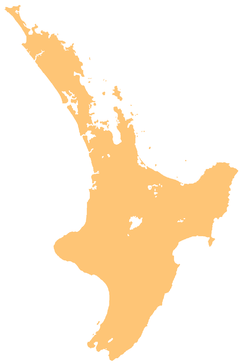Akuaku
Aku Aku | |
|---|---|
Village (abandoned) | |
| Motto(s): Ko Tokatea te maunga; Ko Kiekie te awa; Ko Te Whānau-a-Rākairoa te hapū; Tihe mauri ora! | |
Location of Akuaku in New Zealand's North Island | |
| Coordinates: 37°59′12″S 178°21′32″E / 37.98667°S 178.35889°E | |
| Country | New Zealand |
| Region | Gisborne Region |
| Ward | Waiapu Ward |
| Abandoned | c. 1945[1] |
| Electorate | East Coast |
| Population | |
• Total | 0 |
| Time zone | UTC+12 (NZST) |
| • Summer (DST) | UTC+13 (NZDT) |
| Postcode | 4081[5] |
| Area code | 06 |
Akuaku, also known as Aku Aku, was a settlement about halfway between Waipiro Bay and Whareponga in the East Coast region of New Zealand's North Island.[6][7] A traditional landing point for waka taua, the town is most notable now as the former home (and possible birthplace) of Major Ropata Wahawaha NZC, as well as the ancestral home of Te Whānau-a-Rākairoa.[8][9][10][11]
Akuaku was once a thriving settlement – the hub of the area – with a school, church, and a marae with a wharenui called Rakeiroa.[2][10][12] Akuaku never had road access, and when Waipiro Bay's road was built in the early 20th century, Akuaku's residents began to move.[2][13][14] The final residents left around 1945. Three cemeteries are all that remain of the town today.[1][2]
- ^ a b Soutar, Monty (2003). A Register of Oral History Records on the Social and Economic History of Maori from 1945 to 1995 (PDF). Occasional Publications Series. Vol. 1. Wellington, New Zealand: Crown Forestry Rental Trust. p. 21. ISBN 0-9583708-9-3. Retrieved 15 May 2012.
Kahu Carter [...] [n]otes that the Toheriri family was the last family in Akuaku, leaving about 1945.
NB: ISBN given is probably a misprint in the source. Both WorldCat and Google Books list a different book with the same publisher for that ISBN, Claimant Assistance and Research Services Archived 2013-02-07 at the Wayback Machine (PDF), which has the same ISBN printed in the title page. - ^ a b c d Carter, Paora Kahu (26 July 2010). "Affidavit of Paora Kahu Carter" (PDF). In the Matter of The Treaty Of Waitangi Act 1975 and in the Matter of a Claim by Apirana Tuahae Mahuika on behalf of Te Runanga o Ngati Prou. Wellington, New Zealand: Rainey Collins Wright & Co. pp. 1–5. Retrieved 15 May 2012.
- ^ Cite error: The named reference
AkuakuA3Trustwas invoked but never defined (see the help page). - ^ Cite error: The named reference
MapTVwas invoked but never defined (see the help page). - ^ Postcode Boundaries: Map 3 of 10 (PDF) (Map). National Map Series. New Zealand Post. May 2011. Retrieved 15 May 2012.
- ^ "Te Āitanga-a-Mate – The Descendants of Materoa" (PDF). Gisborne Herald. Gisborne, New Zealand. 2 November 2007. p. 20. Retrieved 15 May 2012.
- ^ Ropata, Meiha (23 June 1873). "Letter from Meiha Ropata to McLean". Wellington, N.Z.: Alexander Turnbull Library. p. 1. Alexander Turnbull Library Reference Number: MS-Papers-0032-0700B-13. Object #1030080. Retrieved 15 May 2012.
Aku Aku
- ^ Cite error: The named reference
Fowler1961was invoked but never defined (see the help page). - ^ Oliver, Steven (1 September 2010). "Wahawaha, Rapata - Biography". Dictionary of New Zealand Biography. Wellington, New Zealand: Ministry for Culture and Heritage. Retrieved 15 May 2012 – via Te Ara: The Encyclopedia of New Zealand.
- ^ a b "Te Rākau i Mataahu – The Flagstaff at Mataahu" (PDF). Gisborne Herald. Gisborne, New Zealand. 9 October 2009. p. 38. Retrieved 15 May 2012.
- ^ Cite error: The named reference
TeWhanau-a-Rakairoawas invoked but never defined (see the help page). - ^ "Large Native Meeting at Akuaku". Poverty Bay Herald. Vol. XI, no. 4000. Gisborne, New Zealand. 31 May 1884. p. 2. OCLC 608881041. Retrieved 15 May 2012.
- ^ Mackay, Joseph Angus (1949). "Chapter XXXIX – Local Government: Waiapu County". Historic Poverty Bay and the East Coast, N.I., N.Z. Gisborne, New Zealand: Joseph Angus Mackay. p. 401. Retrieved 15 May 2012.
- ^ Soutar, Monty (23 August 2011). "East Coast places - Te Puia Springs and Tokomaru Bay". Te Ara: The Encyclopedia of New Zealand. Wellington, New Zealand: Ministry for Culture and Heritage. Waipiro Bay. Retrieved 15 May 2012.
